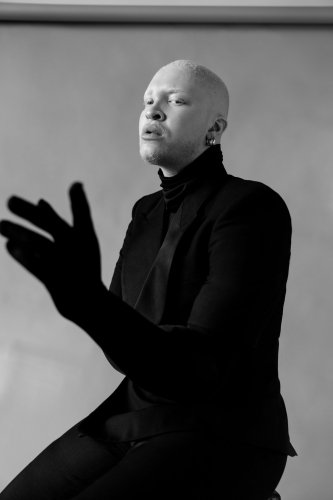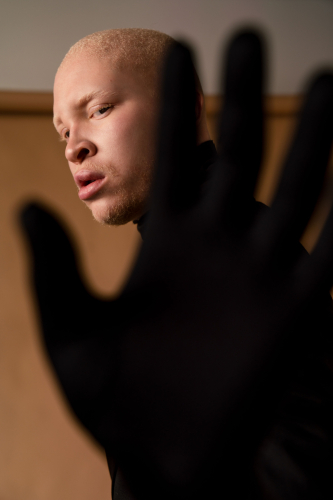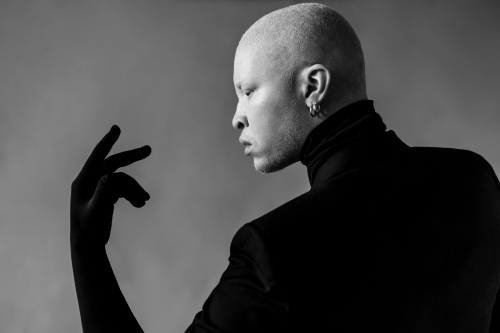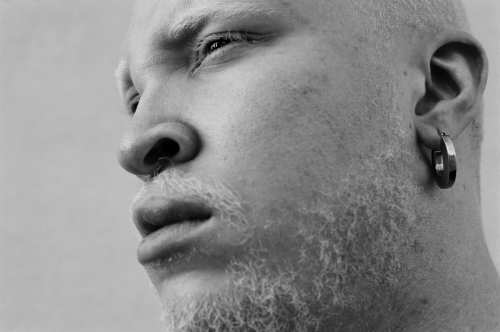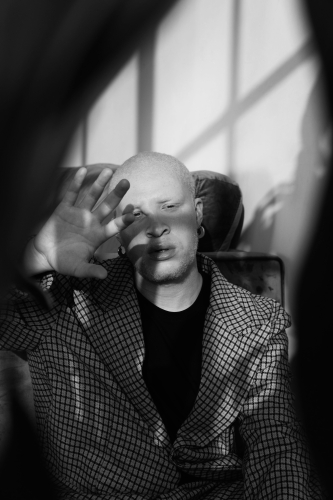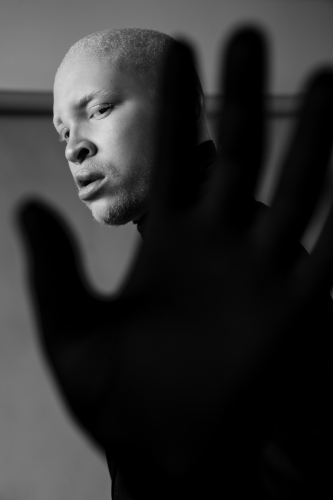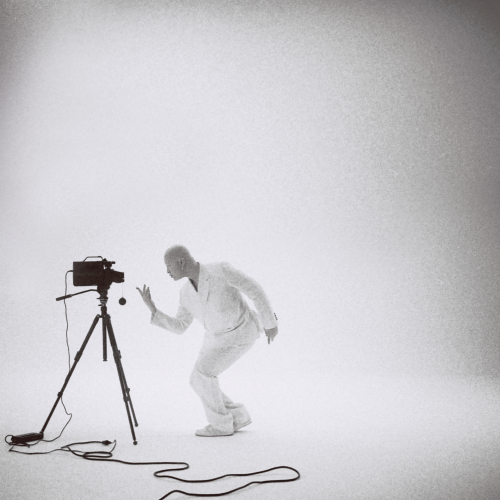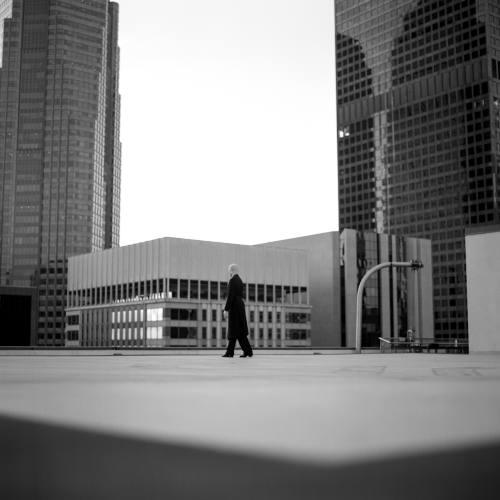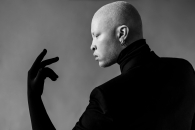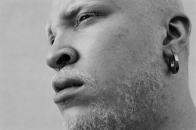Shaun Ross
Click  on photo to download high resolution version
on photo to download high resolution version
All rights reserved. Photos are for editorial use only.
Photos
Latest ReleaseView All
SHIFT
Release date: 5.7.21
Label: Jex Records/Propeller Recordings
Press Releases View All
Shaun Ross Releases “CREAM” ft. R&B Singer Rush Davis
Read MoreRecording Artist And Musician Shaun Ross Announces Debut Album Shift Out May 7th Via JEX Records
Read MoreShaun Ross Releases Single ‘You Care’
Read MoreBiography View
Chances are you're familiar with Shaun Ross, even if his music has yet to grace your ears. A trailblazing model since the age of 16, he's appeared in the pages of GQ and Vogue, and fronted campaigns for the likes of Alexander McQueen and Fendi. Entering the fashion industry at a time of huge upheaval when it came to representation, the 29-year-old New York native helped change the game as an African-American man with albinism, swiftly becoming a figurehead for difference and acceptance. A sidestep towards music came via appearances in music videos by the likes of Katy Perry (ET), Beyoncé (Pretty Hurts) and Lana Del Rey (2013's short film Tropico), but 2021 represents Ross diving headlong into his chosen medium via his sumptuously atmospheric debut album, Shift. Flirting with disco, R&B, pop and ethereal cinematic soundscapes, and taking sonic cues from artists as diverse as Björk, Maxwell, serpentwithfeet, Moses Sumney, and Seal, it's a 10-track odyssey that feels both deeply personal and hugely relatable. Its lead single, the tactile, delicately unfurling electropop of WX5, even chimes perfectly with the loneliness of our current situation; “The TV's a source of light and it's really watching me” Ross coos in a layered voice weighted in experience. It's a soft caress of a song, as opposed to a bolt of lightning. “Some people can be like 'you have to come hard out of the door', but I'm not worried about that,” Ross smiles. “I wanted to set the tone for what people will hear coming in the future. I'm a sensual person.”
Ross cites his musical genre-hopping to his upbringing in the Bronx. While his parents weren't fans of what was playing on the local radio stations, they then chose to educate via their own eclectic tastes. “So every morning my parents would get ready for work and they would blast music,” Ross remembers. “Sometimes I would wake up and there's Björk playing at 7am. Or there's Phyllis Hyman playing, or Donny Hathaway, then there's Everything But The Girl, or The Cardigans. It was such a wide spectrum. Later on I realised 'oh this is why I have my music taste' because my parents played all of these things day in and day out. I wasn't always listening to what everyone else was listening to.”
It was their passion for music that eased him through his troubled times at school, with kids bullying him for the way he looked. “I didn't know I really looked different until I went to school,” he says. “My parents and my family never ever did things to ostracise me or let me know my appearance was different to theirs. Obviously it didn't take a rocket scientist to know that my skin's white and their skin is brown, it was just a thing. It's weird because I'm black but I also know what it's like to be the only white kid in a black school. Because I was the only kid who had any form of pale skin in a school of 500 kids.” His mood was always lifted when he'd return home to find his parents dancing around the family home to their impeccable house music collection (a tradition that still goes on to this day). They also encouraged Ross to stand out even more. “My family never failed to let me know how much of a star I was in their lives,” he smiles. “So if I can be in their lives I can be a star in everyone else's life too. I was always dancing because I think I felt this awkwardness of everyone always watching me, and everyone whispering. I thought, if you're going to watch then I'm going to give you something to look at.”
In fact dance became his first creative outlet at the age of six. “I saw Savion Glover on Sesame Street and he was tap dancing and I was obsessed,” he remembers. “I put my mum's heels on and was making the click clack noise and she was like 'no, not in my heels'. So she took me to the Bronx Dance Theatre and I learned tap and all these other disciplines. Then I went to Alvin Ailey School.” In 2008, at the age of 16 Ross was discovered on YouTube by a modelling agency and plunged into a whirlwind of non-stop travel, photoshoots and runway modelling. Slowly though, after moving to LA, he started to gravitate more towards music, hanging out in studios with artist friends he'd made such as Rosalia, Diana Gordon and Lizzo. He'd also started swapping music recommendations with songwriter and producer Rush Davis, which acted as a huge springboard. “He was like 'you have a really good ear for music, you should start doing music'.” Ross was reluctant at first, bruised by people's scepticism of a model/actor moving into music. It didn't last long. “If you worry about that stuff you don't end up doing what you should be doing,” he says. “I have to do what I want to do for me. Even going back to my modelling career, it's the same thing. When I first came out as a model it was not easy. People who I worked with later on, in the beginning they were telling me 'what the hell are you doing? This doesn't fit with fashion'. Coming into music it's the same thing. People telling you 'why are you doing this?' or you go into a meeting and people say 'oh it will be hard for you', and maybe it's true, but it's not going to stop me doing what I need to do.”
His caramel-soft first single, 2017's Symmetry, produced by Brook D’Leau featured Lizzo on backing vocals and set the template for what was to follow, sonically underlining Ross' love for “bass and space” in his music. “It represented how I felt. The lyric “All this talk about bodies, what is him/her?” makes me feel like a kid, like you're not black enough, or you look weird, or what are you. Even with my sexuality. It all comes down to who cares? There's symmetry that happens all around us.” A similar lyrical motif framed follow-up Chrysalis, before Ross was introduced to producers Michael Tritter and Carlos Chairez who would help him shape Shift. “They're music nerds in the best way,” he says. “I started to go over to their studio and then little by little I started to make more music with them. We have this marriage.”
Together, alongside Rush Davis, they started to create the album. And it is an album, not a mixtape or EP or 'project'. “When artists come out with two projects and then they're like 'now, here's my debut album' and it's like 'I thought that was two albums ago?',” he laughs. “I didn't want to get into that situation. I just wanted to put out an album and that's it.” Its title describes the shifts that have occurred in his life, as well as “the things I am putting out into the universe to experience.” It's also a reflection of a shift in perspective that comes with age. “I'm about to turn 30. There are so many things I'm feeling around me, and it's all coming down to the shift and the way I want to live my life moving forward. I've lived a lot of my life on autopilot and I think it's time to wake up to the things I want to do, and the things I want to see.”
If your debut album is a reflection of your life up until that point then Ross' is all there on Shift. Bookended by his favorite poet Ursula Rucker who he contacted during the pandemic, it deep dives into past relationships via the Maxwell-esque lilt of Waterboy (“He was so obsessed with vanity, like most young gays” Ross giggles), and looks a little closer to home on You Care, an ever-expanding synth-lead behemoth that feels both huge and disarmingly tender. “As individuals, we're not super vulnerable with the way we express ourselves and we should be telling people 'hey, I'm a little fragile.’ You have to tell people how you want to be loved.” Blue Ego, meanwhile, muses on paranoia – an increasingly fertile topic – over a spellbinding blend of disco and glistening R&B. Perhaps recalling those days dancing with his parents, the album also features a proper banger in the shape of Rush Davis collaboration, Cream. “I want this to be a song blasting out a boombox on someone's bike when they're riding around downtown LA,” he smiles. “Rush wrote this song and it resonated with me. It's about how hard you work but you're always knocked down but as long as you have that cream you're able to prevail. It's a song for those people who are struggling but they never give up. There are so many people that can relate.”
It's this tenacity that underpins everything Shaun Ross does, be it changing the face of modeling, advocating for people who are different simply by being successful, or creating music that comes from the heart. Shift is the perfect example of an artist losing their inhibitions and hitting their stride at the perfect time. As 2021 starts to open up, it also feels like the perfect record to slowly grow into people's lives as the mass healing begins. For Ross, it's all part of finally getting people to see him for what he is. “I just want the world to look at me as a musician,” he says. “In fact, I want people to forget that I did modeling. I know my music is good, but it's great to know there are people who became a fan of me based solely off my music.

